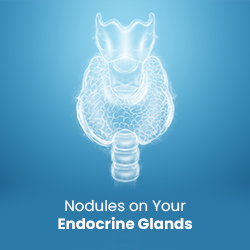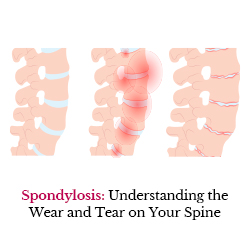Understanding Endocrine Gland Nodules
You are going to your regular checkup, expecting everything to be fine. Your doctor says there is a “nodule” on an endocrine gland. Cancer, surgery, worst-case scenarios flood your thoughts. But take a deep breath. A lump on an endocrine gland doesn’t always mean trouble.
Nodules in endocrine glands are generally common, although most of these are benign. Knowing their cause, symptoms, and treatment makes the fear relatively easy to combat and allows proactivity in your health management. This blog aims to help understand endocrine gland nodules while alleviating many concerns with true, factual knowledge.
What is the Endocrine System?
The endocrine system is a complex mesh of glands that produce hormones, which are chemical messengers responsible for regulating metabolism, growth, reproduction, mood, and sleep. All the glands function together in maintaining balance within the body. Some of the key glands include:
Thyroid Gland: Located in the neck, it regulates the metabolic process by producing hormones called thyroxine (T4) and triiodothyronine (T3). Their disorders lead to the formation of nodules, hypothyroidism, hyperthyroidism, and goiter.
Pituitary Gland: This is the “master gland” at the base of the brain. It regulates other endocrine glands. Nodules in this region lead to hormonal imbalances that impact growth, fertility, and the body’s response to stress.
Adrenal Glands: Situated above the kidneys, these glands produce hormones that regulate metabolism, the immune response, and blood pressure. Adrenal nodules are generally benign but must be assessed.
Parathyroid Glands: These small glands near the thyroid regulate calcium levels in the blood. Parathyroid nodules may lead to excessive calcium production, causing kidney stones and bone weakness.
Pancreas: While primarily involved in digestion, the pancreas also produces insulin and glucagon to regulate blood sugar. Pancreatic nodules can impact glucose control.
What Causes a Lump on an Endocrine Gland?
Nodules can form for various reasons, including:
Benign Growths: Non-cancerous tumors like adenomas that may compress the surrounding structures or overproduce hormones.
Cysts: Fluid-filled sacs resulting from glandular blockages or degeneration, usually benign unless they grow too large.
Inflammation: Conditions such as thyroiditis caused by infections or autoimmune diseases that cause nodules to form.
Iodine Deficiency: Lack of iodine in the diet causes goiter and thyroid nodules.
Hormonal Imbalances: Overproduction of hormones stimulates abnormal growth of glands.
Cancerous Tumors: Nodules are very rare and can be malignant. Such symptoms as rapid growth, voice changes, or unexplained weight loss should be addressed immediately.
Symptoms of Endocrine Nodules
Most endocrine gland nodules do not cause any noticeable symptoms and are discovered incidentally during routine exams. However, depending on their location and hormone activity, symptoms may include:
Thyroid Nodules: Swelling in the neck, hoarseness, difficulty swallowing, unexplained weight changes, and fatigue.
Pituitary Nodules: Vision problems, headaches, irregular menstrual cycles, and hormonal imbalances affecting growth or stress response.
Adrenal Nodules: High blood pressure, unexplained weight gain or loss, excessive hair growth, or muscle weakness.
Parathyroid Nodules: Muscle cramps, kidney stones, bone pain, and excessive thirst.
Pancreatic Nodules: Blood sugar fluctuations, digestive issues, and jaundice.
Diagnosis of Endocrine Nodules
Doctors may employ the following tests to identify the nature of a nodule:
Medical History & Physical Exam: Check for symptoms, family history, and gland size.
Hormone Tests: Blood tests assess the production of hormones and functioning of the glands.
Ultrasound & Imaging Scans: It shows detailed images of the structure of the nodule.
Fine-Needle Aspiration Biopsy (FNAB): Removal of tissue to diagnose cancerous cells.
CT & MRI Scans: Used for deeper nodules in glands, such as those in the adrenal or pituitary.
PET Scans: They are used to identify cancerous activity in a suspected cancerous nodule.
Treatment Approach to Endocrine Gland Nodules
The treatment varies with size, location, and the state of activity of the nodule.
- Observation
Small benign nodules are regularly observed with ultrasound and blood tests so that they do not increase in size or cause problems. Some nodules even diminish in size or stabilize without further intervention in some cases.
- Medication
- Hormone Therapy: Levothyroxine and other medications manage hormone levels in patients with thyroid disease.
- Antithyroid Drugs: Drugs such as methimazole control excessive hormone production in overactive thyroid nodules.
- Corticosteroids: Reduces inflammation in adrenal or pituitary nodules.
- Calcium Regulators: Used in parathyroid conditions to control calcium imbalances.
- Minimally Invasive Procedures
- Radiofrequency Ablation (RFA) & Microwave Ablation (MWA): Heat-based techniques to shrink nodules without surgery.
- Ethanol Ablation: Alcohol injections shrink fluid-filled thyroid nodules.
- Selective Embolization: Used in adrenal gland nodules to block blood supply and shrink growths.
- Surgery
Surgical removal is necessary if:
- The nodule is large or growing rapidly.
- Cancer is suspected.
- It overproduces hormones and doesn’t respond to medication.
- It compresses the windpipe, esophagus, or nearby nerves.
Long-Term Management & Lifestyle Tips
Even if treatment isn’t required immediately, long-term management helps maintain overall endocrine health:
- Regular Check-ups: Monitor nodules with routine medical visits.
- Healthy Diet: Ensure adequate iodine intake through seafood, dairy, and iodized salt.
- Stress Management: Yoga and meditation and exercise have a good hormonal balancing effect.
- Awareness of Symptoms: New or worsening symptoms should be brought to attention immediately.
- Balanced Nutrition: Foods with vitamins and minerals support healthy glands.
- Weight Management: A healthy weight brings reduced stress on endocrine functions.
Conclusion: Take Charge of Your Health with Trilife Hospital
At Trilife Hospital, we specialize in endocrine health, with advanced diagnostics, top-notch endocrinologists, and the latest treatments. Our team will ensure thorough assessment and give you the best possible treatment plans based on your requirements. From a simple follow-up to an advanced intervention, we have comprehensive care for you.
If you or a loved one is worried about endocrine nodules, do not wait anymore. Book an appointment today, and take charge of your health with Trilife Hospital!




